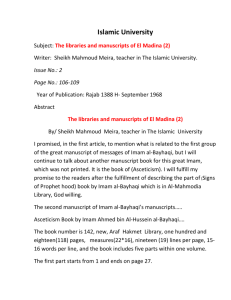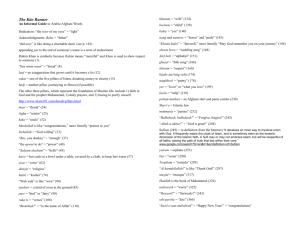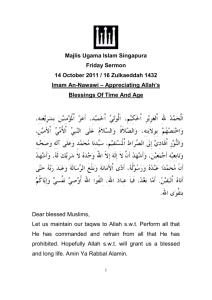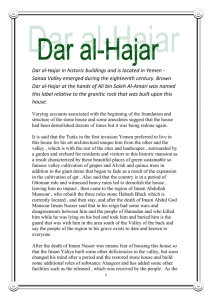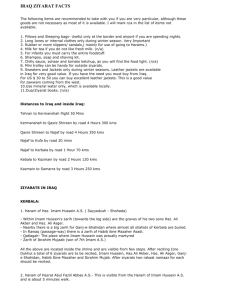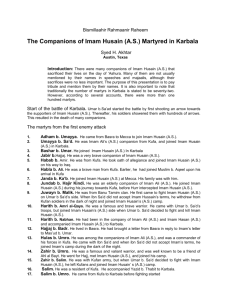Imam Portfolio - Islamic Council of Oklahoma
advertisement
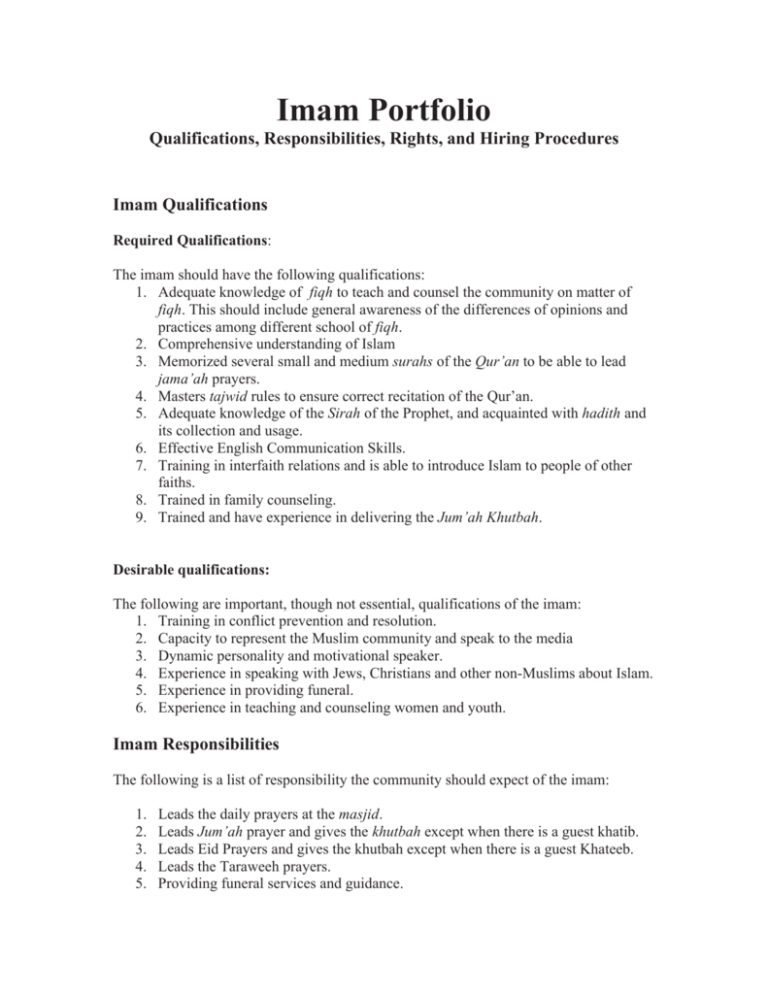
Imam Portfolio Qualifications, Responsibilities, Rights, and Hiring Procedures Imam Qualifications Required Qualifications: The imam should have the following qualifications: 1. Adequate knowledge of fiqh to teach and counsel the community on matter of fiqh. This should include general awareness of the differences of opinions and practices among different school of fiqh. 2. Comprehensive understanding of Islam 3. Memorized several small and medium surahs of the Qur’an to be able to lead jama’ah prayers. 4. Masters tajwid rules to ensure correct recitation of the Qur’an. 5. Adequate knowledge of the Sirah of the Prophet, and acquainted with hadith and its collection and usage. 6. Effective English Communication Skills. 7. Training in interfaith relations and is able to introduce Islam to people of other faiths. 8. Trained in family counseling. 9. Trained and have experience in delivering the Jum’ah Khutbah. Desirable qualifications: The following are important, though not essential, qualifications of the imam: 1. Training in conflict prevention and resolution. 2. Capacity to represent the Muslim community and speak to the media 3. Dynamic personality and motivational speaker. 4. Experience in speaking with Jews, Christians and other non-Muslims about Islam. 5. Experience in providing funeral. 6. Experience in teaching and counseling women and youth. Imam Responsibilities The following is a list of responsibility the community should expect of the imam: 1. 2. 3. 4. 5. Leads the daily prayers at the masjid. Leads Jum’ah prayer and gives the khutbah except when there is a guest khatib. Leads Eid Prayers and gives the khutbah except when there is a guest Khateeb. Leads the Taraweeh prayers. Providing funeral services and guidance. 6. 7. 8. 9. Provides matrimonial and divorce counseling and service. Provide counseling and guidance services as needed. Teaches Qur’anic studies, Tajwid, Tafsir, Hadith, Sirah, Figh, and other Halaqas. Participate in the community activities that further good interfaith and public relations for Islam and Muslims. 10. Act as a resource person for other activities that the community organizes. In addition to the above responsibilities that are functional in nature, the following general requirements pertaining to routine activities and general conduct that must be observed by the Imam: 1. The imam is expected to work about 40 hours a week. 2. The imam is expected to maintain regular and convenient office hours at the masjid for members of the community who seek counsel and guidance. 3. The imam shall interact with all persons and organizations, Muslim and nonMuslim, in a manner that reflects positively on the masjid. 4. The imam shall conduct himself at all times in ways that foster unity and a sense of inclusion among all members of the local Muslim community, and promote broad participation in Islamic and community activities. 5. The imam shall not discriminate on the basis of madhhab, gender, race, nationality, ethnic origin, citizenship, political affiliation, or economic status. 6. The imam shall conduct himself at all times in a manner that is respectful of the history and diversity of the local Muslim community and must show sensitivity to the needs of the local population. Imam Rights and Privileges The imam holds a sensitive position in the community. The quality of his and his family life affects his attitude and performance, and his dignity and standing in the community is reflective of that of his community. The following are a list of items, which should be included in the imam’s contract: 1. Housing — Either housing or salary that allows for adequate housing in safe neighborhood and in close proximity to the masjid. 2. Health Insurance — Adequate health and dental insurance should be provided for the imam and his family. 3. Monetary Compensation — competitive salary should be provided to the imam with religious leaders in the area of service. The cost of leaving in the area should be taken into consideration. 4. Schedule — The imam has the right to a reasonable schedule that is aimed at satisfying both the community’s and the imam’s needs. A number of sick days in which the imam is allowed to take adequate time off when the need arises; Leave of Absence — and an annual vocation of no less than two weeks. 2 Imam Recruiting and Hiring Procedures The masjid leadership should establish an Imam Search Committee that would be responsible for recruiting and hiring the imam. Membership of the committee should be broad enough to represent the various segments of the community. This committee should follow the following procedure: 1. Advertisement: The advertisement should spell out the imam qualifications, responsibilities, and outline benefits. 2. Initial Screening: The following instruments may be used for the initial screening: a. Telephone Interviews: Telephone interviews can be helpful to determine if the candidate meets some of the qualifications such as language skills, recitation of Qur’an, etc. b. References (Background Checks): Use all available means to check the background of the candidates including contacting any references. This is very crucial step, as the skill to advertise oneself do not always much real experience, character, and qualifications. 3. Short Listing: utilize the results of the screening process to make a short list of candidates who should be called for on site interviews. 4. Interview Process and Program: Each candidate on the short list should be invited for a series of one-on-one interview sessions as well as a series of public activities to allow the local Muslim community to see and interact with the candidates. The interview process should involve both of the following activities: a. Face-to-Face Interviews: A set of questions needs to be prepared to ask all candidates by the Imam Search Committee members. Each member of the search committee can add other questions during that member’s interview session with a candidate. The Imam Search Committee can enlist the help of others beside its members to conduct some interviews for any or all candidates when a particular area of expertise is needed. b. Public Programs: Potential candidates should be given a chance to conduct a Khutba, a Halaqa, and/or a lecture etc to give members of the ICGA community a chance to experience and evaluate the candidates. 3 5. Evaluation: Two evaluation forms should be prepared ahead of time. One form for the one-on-one interview sessions, to be filled by each interviewer. The other to be filled by individual board members to evaluate each candidate based on their interaction during the public programs. The Imam Search Committee should collect all copies of both evaluation forms, tally the results into two summary reports one for each of the two modes of interaction, rate all candidates, and create an ordered list of the candidates based on their performance. 6. Recommendations: After evaluating all the potential candidates, make the final recommendations to the governing board for their decision. The final recommendations and all generated materials during the process must be included in the final report of the Imam Search Committee. These include advertisements, filled applications, initial screening reports, interview forms, and community input forms. The governing board should, after evaluating the Imam Search Committee report, decide what to do with respect to hiring a new imam. If the process clearly found a good candidate or candidates, it should instruct the Imam Search Committee to start the negotiation process with the potential candidate to reach an agreement. If however, the process did not result in finding an acceptable candidate, the process must be repeated. 4
